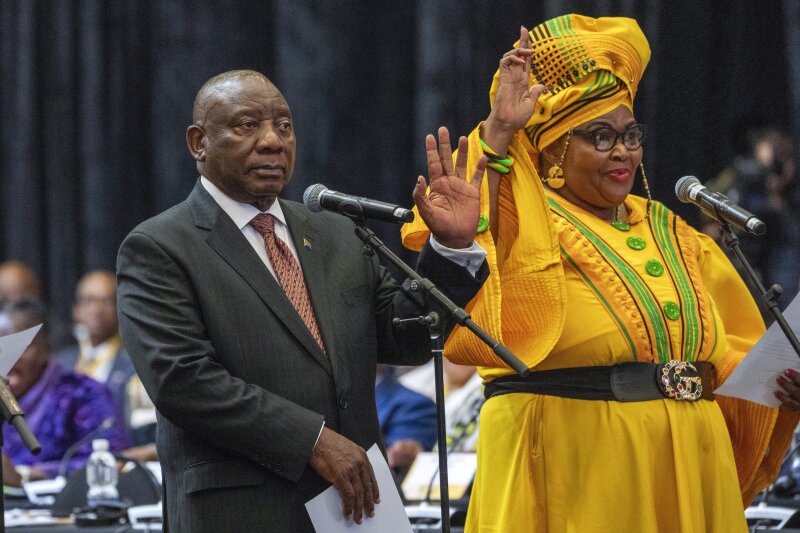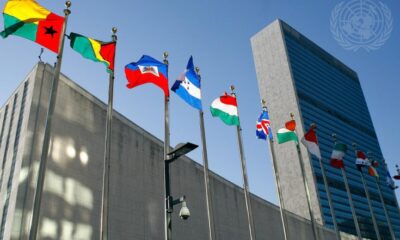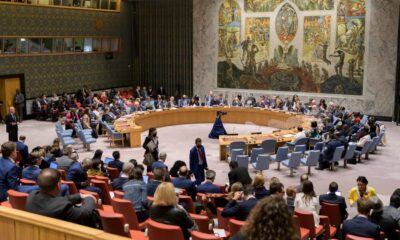Behind the News
Behind the News: All the backstories to our major news this week
Published
5 months agoon

Over the past week, there have been many important stories from around the African continent, and we have served you some of the most topical ones.
Here is a rundown of the backstories to some of the biggest news stories in Africa that we covered during the week:
South Africa’s ANC remains in power despite electoral setback
It appeared that the dust had finally settled on South Africa’s 2024 general elections as its National Assembly concluded voting on the post of the Speaker of the Parliament, President, with the candidates of the ruling All National Congress (ANC) Thoko Didiza, and Cyril Ramaphosa emerged occupants of the country’s highest political jobs. The ascendancy of Didiza and Ramaphosa is the result of a coalition. The ANC and DA currently hold 246 of the 400 seats in the freshly elected National Assembly, which is enough to establish a coalition government.
The ANC party lost its parliamentary majority in an unprecedented election result, putting South Africa on a new political path for the first time since the end of the apartheid system of white minority rule thirty years earlier. In the election on Wednesday, the once-dominant ANC received roughly 40% of the vote, falling well short of the majority it had routinely secured—more than 60% of the vote—in every election since 1994 when apartheid was abolished and put under Nelson Mandela’s leadership.
The swaged performance notwithstanding, the ANC managed a coalition which the populist Economic Freedom Fighter (EFF) maintained it “contested because we wanted to demonstrate to South Africa that we did not agree with the marriage of convenience to consolidate the white monopoly power to dominate the economy and the means of production in South Africa. This marriage seeks to undermine the changing of property relations in South Africa. We refused to sell out, we had never done so when we were young and are not going to do so today.”
Since every party has distinct policies and views, the new government’s makeup will have a direct impact on South Africa’s future. Compromises and inter-party confidence building along the lines of President Nelson Mandela’s Government of National Unity, which included all of the ANC’s political rivals, including the National Party, following the first competitive multiparty elections in 1994, will be necessary for a government of national unity to be stable and effective for the people.
Nigeria strolling out of another FIFA World Cup
Nigeria’s senior football team is having it tough again on its journey to the World Cup after a devastating 2-1 loss to the Benin Republic at the Stade Félix Houphouët-Boigny in Abidjan. The Super Eagles have failed to win the AFCON twice and make it to the 2022 World Cup since former Nigerian coach Genet Rohr was fired in December 2021. On Monday, Rohr guided the Benin Republic to their first-ever senior victory over Nigeria in international football. The German Cheetahs appeared more disciplined, fit, and focused than Finidi’s Eagles. The loss marked the first time in 17 games over 47 years, dating back to a 7-0 victory in February 1977, that Nigeria had ever allowed two goals against Benin.
Nigeria had an amazing record against the Beninoise in their previous 14 games, with 12 wins and 2 ties. In their two games against Benin, not even the CHAN Eagles scored two goals. Nigeria’s record now includes a defeat, courtesy of coach Finidi Geroge and his less-than-stellar Super Eagles. Unfortunately, it happens not at an international friendly but during a World Cup qualifier.
With three points after four games and currently four points behind the Benin Republic, who moved up to the top of Group C following their thrilling victory in Abidjan. The calculators and permutations are out already for Nigeria, If Zimbabwe wins their match, Nigeria will stay in fifth place in the group and may perhaps drop to the bottom.
The Super Eagles have not won any of their previous seven games in the series, with six draws and one loss. This is Nigeria’s worst run ever during the World Cup qualifying campaign. The game run isn’t of a team ready to compete at the Mundial against the top countries. Thus the Eagles are set to miss out on the North American party as the World Cup will be co-hosted by the United States, Canada, and Mexico. Nigerians will hope the situation can be salvaged with George Finidi’s now out of the job following his resignation on Saturday.
Nigeria’s Democracy Day and the many questions
Since gaining independence, Nigeria’s democracy has been brittle and inconsistent, despite the hurdles, the West African country marked twenty-five years of uninterrupted civil reign in the current fourth republic which began in 1999 after years of military interregnums on Wednesday, being 12th of June the date of a water-shed presidential election widely believed to have been won by Chief MKO Abiola. More than 200 ethnic groups make up this complex nation, whose borders were determined by British colonialists, and successive governments have battled to forge a sense of national unity. The various regions of the country have had varying rates of democratization and development.
Former President Muhammadu Buhari issued an order on June 7, 2018, changing the date of the country’s Democracy Day from May 29 to June 12 annually. Additionally, Buhari bestowed the highest national title, the Grand Commander of the Federal Republic, upon Chief Moshood Abiola, the victor of the cancelled June 12, 1993, presidential election. Buhari went on to say that since Nigeria’s independence, the June 12. The 1993, election was the most peaceful, fair, and free one.
The civil war and the military era’s concentration of power gravely damaged Nigeria’s democracy. The battle developed a strong, affluent, and frequently dishonest military elite and contributed to the concentration of oil earnings in the hands of army officials. Nigeria’s political sphere was militarized by the dictatorships, and the emergence of democratic institutions and culture was impeded.
Nigeria’s democratic years are counting, but Nigeria remains below average in the reality of democratic indicators, notably on matters relating to civil rights, economic and social rights, civil and political participation, free and fair elections, rule of law, military and police control, government accountability and media tolerance. At no other time does the country needs the true expression of Bola Tinubu’s catchphrase of “Renewed Hope” beyond mere rhetorics.
From Palace to Trial: Story of Niger’s ousted President Bazoum
The travails of the ousted Nigerien president, Mohamed Bazoum went tougher on Friday as his lawyers confirmed that the State Court of Niamey has withdrawn the immunity, signalling the beginning of criminal proceedings against him by the junta. Bazoum was overthrown by a military coup in July of last year and placed under house arrest with his family after the coup. Since then, the Western countries and the ECOWAS regional political and economic bloc have repeatedly called for his release, but he and his spouse have stayed in detention.
Bazoum and his spouse have never appeared before a magistrate, according to his attorneys. Attorneys claimed that since October, when the White House disconnected their phone line, they have been isolated from the outside world and are only allowed to receive visits from their physician. The Niger military tribunal granted temporary release from home confinement to Mohamed Bazoum Salem, the deposed president’s 23-year-old son, in January.
Eight coups in West and Central Africa have resulted in the installation of military governments since 2020. Even after ruling last year that Bazoum’s arrest was unlawful, the ECOWAS Court of Justice has not responded to calls for his reinstatement.
The coup has put the country against a lot of its international allies particularly because the country favoured relations with France whose influence in Africa is fading fast. The French military was driven out of the region by new regimes in Mali, and Burkina Faso in the current wave. Since then, a law that assisted in preventing individuals from West Africa from travelling to Europe has been repealed. To reduce the number of illegal immigrants, the EU wishes to collaborate more closely with African nations.
Bazoum represents a political establishment, being the continuity candidate in the last election and a former foreign affairs minister in a country regularly ranked as the world’s poorest where jihadist attacks have surged in recent years and his legal travails are capable of upsetting the polity beyond just military incursion.
You may like
-


Behind the News: All the backstories to our major news this week
-


Behind the News: All the backstories to our major news this week
-


-


Behind the News: All the backstories to our major news this week
-


Behind the News: All the backstories to our major news this week
-


Behind the News: All the backstories to our major news this week
Behind the News
Behind the News: All the backstories to our major news this week
Published
1 month agoon
October 18, 2024
Over the past week, many important stories from around the African continent were published, and we served you some of the most topical ones.
Here is a rundown of the backstories to some of the biggest news in Africa that we covered during the week:
Another look at Africa’s debt crisis
Conversations around Africa’s public debt were on the table during the week as Achim Steiner, administrator of the United Nations Development Programme, stated on Monday that the world’s poorest countries were unable to meet sustainable development targets because they had to prioritise debt payments over investments.
Addressing a gathering in Hamburg, Steiner asserted that the world financial crisis was impeding countries’ ability to accomplish the objectives, which include eradicating hunger and poverty, increasing access to healthcare and education, providing sustainable energy, and protecting biodiversity.
Since the COVID-19 pandemic’s pervasive effects on economies, the majority of the continent’s nations have suffered with both internal and international debt; yet, few have achieved much in the fight for debt restructuring under the G20 framework.
Numerous African nations, including Egypt, Tunisia, Nigeria, Ghana, Zambia, and others, are struggling with significant foreign debt. Together with Zambia and Ghana, Ethiopia will be a part of a thorough restructuring known as the “Common Framework.”
At the opening ceremony of the annual African Union summit in Ethiopia last year, UN Secretary-General Antonio Guterres made the case for changes to the international financial system’s structure to better meet the requirements of developing nations.
Africa’s whole external governmental debt as of 2021 was 726.55 billion USD. The amount of foreign public debt increased from 696.69 billion dollars in comparison to the previous year.
Concerns are being raised by the rising debt levels in Africa, which could not only hinder economic growth but also make repayment nearly difficult for many of these nations. This begs an important question: When does debt stop being beneficial and instead start to negatively impact a nation’s economic performance?
Kenya remains committed to Haiti, but what does it stand to gain?
Kenya will support an international anti-gang effort in Haiti next month by dispatching an additional 600 police officers there. Haiti’s prime minister was in Kenya to expedite the deployment of the military.
At least eleven countries have pledged to send more than 2,900 soldiers to participate in the Multinational Security Support (MSS), led by Kenya.
Kenya, whose participation in international peacekeeping missions is longstanding, declared earlier this year that it would be deploying 1,000 police personnel, citing as a starting point its assistance to a bordering country.
Approximately 600,000 individuals have been internally displaced due to gang conflict, and hundreds of thousands of aspiring migrants have been deported back to Haiti, where approximately 5 million people are facing extreme famine. October marks the end of the mission’s first 12-month term. As gang violence worsened in 2022, Haiti turned for the first time to foreign assistance.
Nevertheless, it failed to identify a leader prepared to assume the helm and numerous foreign governments were reluctant to back the unelected administration in the desperately poor nation.
Kenya gains significant political value by sending its troops to Haiti on the international scene. Kenya has gained international recognition as a trustworthy ally that is eager to assist other nations. The mission opens up various opportunities. Prior to deployment, Kenyan law enforcement forces will receive specialist training and equipment. In the long term, this will increase the force’s capacity. Of course, there are monetary rewards as the participating nations receive allocations of resources. Because troops will receive additional pay, officers are very interested in being deployed overseas.
Cameroon: ‘Healthy’ Biya remains out of sight
Cameroon’s president, Paul Biya can now be likened to the proverbial cat with nine lives as the 91-year-old has remained “healthy” following latest reports of his death during the week. Rumours have been circulating about Cameroonian President Paul Biya’s possible death in a military hospital in France due to his extended absence. This rumour stems from Biya’s prolonged absence following the September China-Africa Summit when he was anticipated to head back to Cameroon almost away.
As of November 6, 1982, Biya, who is 91 years old, has been in office for 42 years. He is the oldest head of state in Africa, the longest-lasting non-royal national leader worldwide, and the second-longest serving president overall. According to rumours, Biya’s oldest son Franck Emmanuel Biya may be named as his replacement for “continuity” in France.
Since its political independence from France and Britain in the early 1960s, Cameroon has only had two presidents. The country is currently dealing with two serious crises: a deadly Boko Haram insurgency in the north and a separatist conflict that has claimed thousands of lives.
President Biya is one of several long-serving African leaders, including Yoweri Museveni of Uganda, who has been in office since 1982, and Teodoro Obiang Nguema Mbasogo of Equatorial Guinea, Rwanda’s Paul Kagame is also gradually evolving into the group.
Things get tougher for embattled Kenyan Deputy President
During the week, the deputy president of Kenya was impeached by the National Assembly due to charges of corruption and abuse of power. In a vote held Tuesday night, lawmakers decisively decided to remove Rigathi Gachagua from office. The Senate will now decide what will happen to the deputy president.
Parliament adopted a proposal to remove Kenya’s deputy president from office, and on Wednesday, the matter was brought to the Senate for consideration. The National Assembly heard a nearly ninety-minute defence of troubled deputy president Rigathi Gachagua and his allies prior to the vote.
A surge of protests targeting President Ruto’s government has been occurring in Kenya over the last four months due to accusations of corruption made by certain lawmakers and government officials. High taxation and the parliament’s purported inability to act independently of the president were other issues that Kenyans objected to. Gachagua refutes the accusations made by certain lawmakers, who claim that the deputy president assisted in planning rallies against the government.
He supported Ruto in his election victory in 2022 and assisted in obtaining a sizable portion of the vote from the populated central Kenya region. Gachagua, however, has mentioned feeling marginalised in recent months, despite extensive claims in the local media that he and Ruto have strained political ties.
After widespread protests over unpopular tax increases in June and July that claimed more than 50 lives, Ruto sacked the majority of his cabinet and appointed members of the main opposition.
Gachagua infuriated many in Ruto’s coalition by comparing the government to a business and implying that people who supported the coalition had first claim to development projects and jobs in the public sector. Ruto has not yet publicly commented on the impeachment proceedings.
Behind the News
Behind the News: All the backstories to our major news this week
Published
2 months agoon
October 3, 2024
Over the past week, many important stories from around the African continent have been published, and we have served you some of the most topical ones.
Here is a rundown of the backstories of some of the biggest news in Africa that we covered during the week:
Musings on CBN rates across Africa: Ghana, Nigeria, and South Africa
During the week, many African countries announced monetary policy decisions. The Central Bank of Nigeria decided unanimously on Tuesday to raise its benchmark interest rate by an additional 50 basis points, to a new record high of 27.25%. This is the sixth hike in a row this year. The decision was made in an effort to reduce inflation, strengthen the naira, and draw in capital. Governor Olayemi Cardoso reaffirmed the bank’s commitment to controlling inflation and underlined how several rate hikes have contributed to its moderation.
Nigeria’s West Africa neighbour followed suit on Friday as the Bank of Ghana reduced its benchmark monetary policy rate by 200 points to 27% at a normal meeting. With inflation having slowed and disinflationary pressures mounting, this is the first decline in eight months and the steepest since March 2018. August 2024 saw a fifth consecutive month of decline in Ghana’s annual consumer inflation, which was still much higher than the central bank’s medium-term target range of 6% to 10%. The country’s annual inflation rate dropped to a nearly two-and-a-half-year low of 20.4% from 20.9% in July.
A week prior, as anticipated, the South African Reserve Bank decreased its benchmark interest rate by 25 basis points to 8% after holding seven consecutive meetings at a 15-year high of 8.25%. As price pressures decreased, the SARB is loosening policy for the first time since the epidemic in 2020
As monetary varying shifts across the continent continue, African nations are still facing numerous severe shocks and significant structural challenges, such as rising food and energy prices brought on by geopolitical tensions like Russia’s invasion of Ukraine, climate issues that impact agriculture and energy production, and ongoing political instability.
Africa’s real GDP growth slowed to 3.1% in 2023 from 4.1% in 2022 as a result of this difficult climate. With growth predicted to reach 3.7% in 2024 and 4.3% in 2025, the economic picture is projected to improve going ahead, underscoring the resilience of African countries.
Zambia and its post-drought plans
Zambia’s finance minister, Situmbeko Musokotwane stated on Friday that the nation intends to quickly recover from its worst drought in living memory and cut its budget deficit in half the following year.
The minister stated in a budget address that the copper producer hopes for a 6.6% growth in 2025, as opposed to a projected 2.3% increase in 2024. The country is aiming for a speedy recovery. as the government crop assessment data shows that over nine million people are affected in 84 of the 117 districts after suffering through the driest farming season in over forty years, which has led to considerable crop losses, an increase in livestock deaths, and worsening poverty,
Real GDP increased gradually between 2022 and 2023, from 5.2% to 5.8%. The supply side was driven by mining and quarrying, wholesale and retail commerce, and agriculture; the demand side was driven by consumer and business spending. Food prices, transit expenses, and the nominal exchange rate are the key drivers of inflation, which is expected to remain elevated and reach 11.0% and 10.9% at the end of 2022 and 2023, respectively.
The economic challenges faced by Zambia are exacerbated by the drought, especially when considering its debt load. Its debt restructuring talks under the G20 Common Framework have progressed far more slowly than was originally anticipated when the Common Framework was first proposed.
In 2017, Zambia was placed under debt distress, and as a result, non-concessional lending from multilateral development banks was discontinued. It’s possible that by overestimating sovereign risks, the main credit rating firms exacerbated the debt crisis and dealing with a post-drought crisis might just be another “too high hurdle”
As the World Bank and Uganda LGBTQ saga continues
The World Bank is taking more action in support of Uganda’s LGBTQ community. The global lender announced on Wednesday that it is implementing steps to guarantee that lenders to Uganda are not subjected to discrimination due to a severe anti-gay law. According to a World Bank representative, both new and continuing projects would be subject to the procedures, which also include an impartial monitoring system to guarantee compliance.
Same-sex partnerships are forbidden and punishable by life in prison; similarly, anyone convicted of “aggravated homosexuality” faces the death penalty. The Anti-Homosexuality Act (AHA) was passed by Uganda, a largely conservative nation, in May of last year and it has led to considerable Western censure and US penalties.
Other than Uganda, several African nations have strict laws that discriminate against individuals who identify as LGBTQ. Hakainde Hichilema, the president of Zambia, issued a warning in March to supporters of the LGBTQ movement to stop endorsing homosexuality. He also asked that Zambia “maintain laws that abhor alien orientations like gayism and lesbianism.”
South Africa, which has a constitution that forbids discrimination based on sexual orientation, was the first and only African nation to legalise same-sex marriage in 2006. Some African nations, such as Angola, Mozambique, Botswana, Lesotho, Mauritius, and Seychelles, have laws that are favourable to the continent’s population but Uganda appears to be unbothered or tempted despite the many causes and costs of its anti-gay stand.
Ahead of Tunisia’s presidential election
During the week, another Tunisian presidential candidate Ayachi Zammel was convicted and sentenced to six months imprisonment for using “fraudulent certificates” as opposition voices in the North African country continue on attack as President Saied positions himself for what is likely to be a reelection, as all but one of the opposition candidates are either incarcerated or have had their eligibility ruled invalid by the Tunisian electoral commission.
On September 19, a third candidate who had received the election commission’s approval was sentenced to 20 months in prison. Saied, who is currently running for reelection for a second five-year term, was originally elected in 2019 as an anti-establishment candidate who pledged to combat poverty and eradicate corruption. However, in 2021 he declared that he would rule by decree after overthrowing Mohamed Ennaceur and the elected parliament, a move denounced as a coup by the opposition and the international community.
Additionally, he has deployed more oppressive strategies, which may indicate that he is not confident in his ability to win with conviction. His severe actions could indicate a new stage in Tunisia’s democratic backsliding and foreshadow more crackdowns and turmoil during an inevitable second term.
Meanwhile, concerns exist over potential voting turnout as well. Under Saied, Tunisia has conducted three elections, with dismal voter turnout in each. Less than one-third of voters cast ballots in favour of a new constitution that solidified Saied’s power and overthrew the 2014 charter in July 2022. After Saied dismissed the previous legislature in December 2022, only 11% of voters cast ballots for new members of parliament, which is among the lowest turnout percentages ever recorded in a national election worldwide. The next December, Saied called elections for a new second house of parliament, repeating this dubious performance.
EDITOR’S PICK


Ghana partners with The Gambia to provide free roaming services
Ghana and The Gambia are in the process of launching free roaming services that will enhance a West African connectivity....


Zambia: APP leader lampoons PF over pledge to reverse forfeited properties
Leader of one of Zambia’s opposition parties, Advocates for People’s Prosperity (APP), Mwenye Musenge, has criticised the Patriotic Front (PF)...


Ghanaian winger Fatawu out for season with ACL injury
Ghana and Leicester City winger, Abdul Fatawu, has been ruled out of the rest of the EPL season after suffering...


DRC authorities arrest six over break-in at Lumumba’s Mausoleum
Police in the Democratic Republic of Congo (DRC) say six people have been arrested over a break-in and vandalism at...


Finnish court imprisons Nigeria’s Simon Ekpa for aiding terrorism
Simon Ekpa, a Nigerian separatist leader based abroad, has been placed under detention by the Päijät Häme District Court...


Nigerian Senate confirms influx of terrorists from Mali, Burkina Faso into the country
The Nigerian Senate has raised the alarm over the influx of terrorists from Mali and Burkina Faso who operate in...


Tanzania to host 6th Ocean Innovation Africa summit in February
Dar es Salaam, Tanzania, has been selected to host the sixth edition of the Ocean Innovation Africa (OIA) summit from...


Miss SA opens up on why she withdrew from Miss Universe pageant
Reigning Miss South Africa 2024, Mia le Roux, has opened up on the reasons behind her withdrawal from the Miss...


SA football legend Lucas ‘Masterpieces’ Moripe passes away
South African football legend, Lucas “Masterpieces” Moripe, has passed away at the age of 71 after a long battle with...


Wanted Zambian MP who escaped from prison custody captured in Harare
A fugitive Zambian Member of Parliament (MP), Emmanuel Banda, who escaped from custody at the Chipata Prison in Eastern Province...
Trending
-

 Metro1 day ago
Metro1 day agoWanted Zambian MP who escaped from prison custody captured in Harare
-

 Sports1 day ago
Sports1 day agoSA football legend Lucas ‘Masterpieces’ Moripe passes away
-

 Culture1 day ago
Culture1 day agoMiss SA opens up on why she withdrew from Miss Universe pageant
-

 Politics1 day ago
Politics1 day agoUgandan opposition politician abducted, wife says


